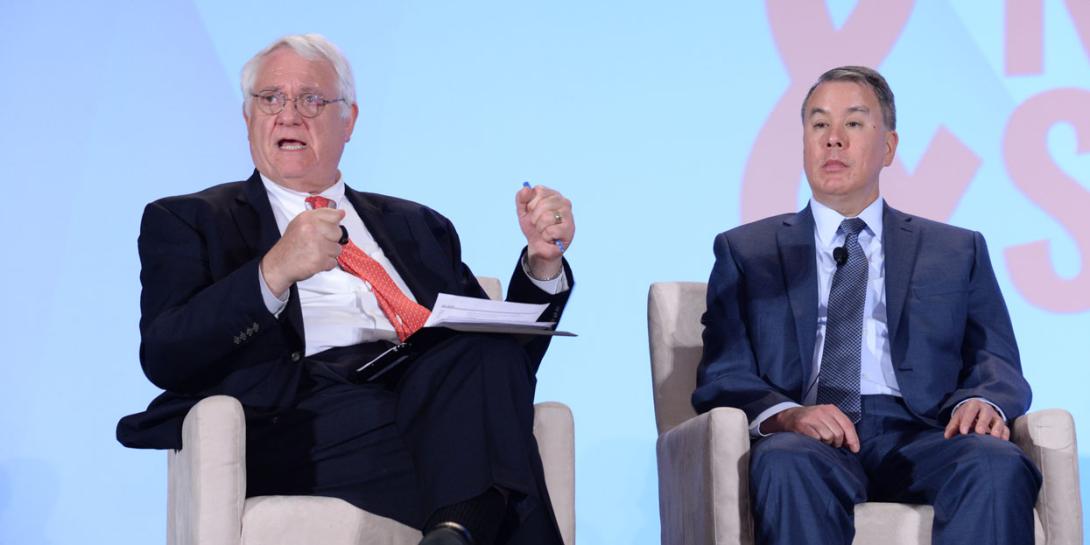Technology Both Empowers and Undermines National Security
Across-the-board innovation is increasing the national security threat picture, and the U.S. Defense Department is preparing to respond in kind. Technology advances such as hypersonics and artificial intelligence may join macroprojects such as a new space force as peer and near-peer adversaries gear up to overcome U.S. military superiority.
The world is not lacking for hostile rivals who seek to exploit U.S. vulnerabilities, noted a panel of defense and intelligence experts on the first day of the 2018 Intelligence and National Security Summit sponsored by AFCEA International and INSA at National Harbor, Maryland. U.S. foes range from past and would-be superpowers to rogue states and terrorist groups that will not go quietly.
China is leveraging a large-scale military effort combined with economic coercion against large and small economies, noted John Rood, undersecretary of defense for policy. “We see that as establishing regional hegemony in the short term and replacing the United States as a superpower in the long term,” he declared.
China is leveraging a large-scale military effort combined with economic coercion. We see that as establishing regional hegemony in the short term and replacing the United States as a superpower in the long term.—John Rood, undersecretary of defense for policy #Intelligence2018
— Bob Ackerman (@rkackerman) September 4, 2018
Russia is working with China to undermine U.S. power worldwide, he continued. One of Russia’s strategies is to seek “veto authority” over neighbors and other regional countries. The former superpower is trying to turn NATO members against one another, he observed, and he stated that the recent NATO summit featured more agreement than disagreement. Cooperation among allies is improving, and most are boosting their defense budgets significantly in response to U.S. criticism.
Rood noted that while nation-state adversaries are the department’s top worry, non-state actors and terrorists remain a problem. The terrorist threat remains strong, he maintains.
While states are our primary concern, non-state actors and the threat from terrorism remain very strong.—John Rood, undersecretary of defense for policy #Intelligence2018
— Bob Ackerman (@rkackerman) September 4, 2018
The cyber arena poses challenges across the board for the defense and intelligence communities. “If you focus on the big, the slow drip happens out the back. And the slow drip [in cyber] is the theft of intellectual property from our economy,” said George C. Barnes, deputy director, National Security Agency (NSA).
When asked if the threshold for cyber attack had been crossed, all the panelists agreed it had been crossed long ago, and the problem is worsening. “We’ve crossed the threshold of a major cyber attack many, many times,” Rood offered. “We are being challenged on a daily basis. The question is when will we see it combined with other effects.” This already has happened in the Baltic republics and Ukraine, he added.
We’ve crossed the threshold of a major cyber attack many, many times. We are being challenged on a daily basis. The question is when will we see it combined with other effects.—John Rood, undersecretary of defense for policy #Intelligence2018
— Bob Ackerman (@rkackerman) September 4, 2018
Barnes related that cyber attacks can have long-term deleterious effects. He added that the NSA “is literally stuck in the middle of the wave of technology sweeping the world. We have to secure it and know how the exploit it.”
NSA is literally stuck in the middle of the wave of technology sweeping the world. We have to secure it and know how the exploit it.—George C. Barnes, deputy director, NSA @NSAgov #Intelligence2018
— Bob Ackerman (@rkackerman) September 4, 2018
Rood offered that hypersonics and artificial intelligence are the next U.S. defense growth areas, saying the Defense Department would be “making a fist around artificial intelligence.”
Space may be the next battleground, and the panelists offered their own perspectives on the proposed U.S. Space Force. The NSA’s Barnes said that the agency is “increasingly preoccupied” by the threats in space. Justin Poole, deputy director, National Geospatial-Intelligence Agency (NGA), declared, “When there is a Space Command, NGA will be there.” And Rood stated the Defense Department will submit a proposal to Congress in next year’s budget to establish a U.S. Space Force.
We are increasingly preoccupied by the threats in space.—George C. Barnes, deputy director, NSA @NSAgov #Intelligence2018
— Bob Ackerman (@rkackerman) September 4, 2018





Comments